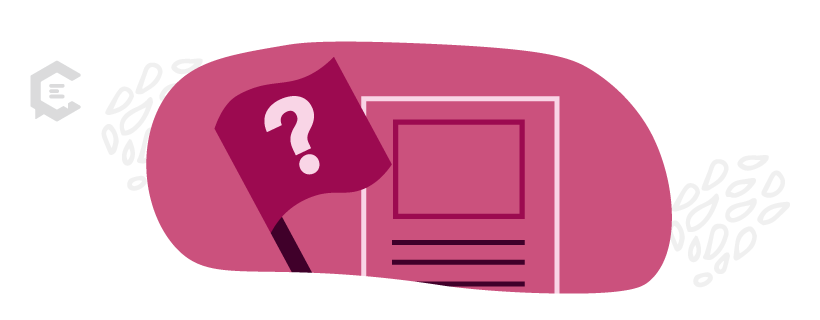Freelance scams are an unfortunate part of life as a freelancer.
The start of every freelancing career is an exciting time. Unfortunately, it’s getting harder and harder to tell which content writing jobs are legitimate and which are freelance scams.
These scams seek to take advantage of freelancers for various purposes. Some are designed to provide the scammer with free work, which they’ll get by asking for a trial period or promising a payment that never comes. Other typical freelancer job scams are simply a front to steal your identity.
During your freelance career, the best way to avoid getting scammed is to educate yourself on the most common ways scammers try to catch you off guard. This guide will go over the warning signs of a freelance scam and the four most common ones happening right now so you’re ready.
The Warning Signs of Freelance Scams
Regardless of the scammer’s method to try and dupe you, most scams have a few red flags that pop up. If you connect with a new client that’s showing any of these warning signs, be wary.
1. They contact you out of the blue
Most reputable clients want their freelance writers to be able to demonstrate their skills, so they’ll do their due diligence before reaching out. This usually involves them looking at your website or your ClearVoice portfolio.
If a potential client contacts you out of the blue and wants to move forward without seeing your work, it’s a sign that they’re more interested in your vulnerability than your skills.
2. They rush the process
In freelance scams, the scammer is counting on being able to get what they need from you (money, information, or work) before you realize what’s going on.
If an initial conversation or job interview ever feels rushed and/or confusing, it could be a red flag.
3. The pay is too good to be true
This is a tricky warning sign since compensation across content writing and other related jobs varies widely. However, if the pay you’re being offered for a project or a role feels too good to be true, it likely is. Instead, focus on growing your rates naturally to get to where you want to be.
4. You can’t find any details about their company online
Even if you’re working with a start-up or smaller business, you should be able to find some information about the company or its staff online.
If all your searches turn up empty, or if the details you see don’t match what they’ve given you (such as different emails or names of staff), the individual you’re talking to may be a fraud.
5. Poorly written correspondence
If an individual hasn’t taken the time to proofread an email or job posting, it may be a sign that they’re throwing out tons of lines and looking for anyone desperate enough to bite. No professional company would want their official correspondence to be poorly written.
4 Common Freelance Scams You Need to Know
How do you tell if someone is scamming you online? It gets a lot easier when you know what types of scams to watch out for. Here are some of the most common freelance scams you may see today.
The fake job post
These freelance scams have become common on sites like Craigslist but can also be found on dedicated freelance marketplaces. With these fake job posts, typically, the scammer is looking for you to give them your contact details as quickly as possible so they can sell them.
You can protect yourself by researching the company first to find out if they’re legitimate and also requesting to speak to someone over video before moving any further.
The free sample request
This scam targets newer freelance writers who are eager to prove their value and book work.
In this scam, freelancers will apply for a job only to be told they need free work so the company can evaluate their skills first-hand. The company usually wants to get as much free work as possible and never intends to pay.
To avoid this, build a portfolio on ClearVoice or your own website so you can showcase your writing samples and past work. Then, offer that to potential clients so they can see your skills for themselves.
Impersonating a legitimate business
Often, scammers try to cloak themselves in authenticity by either stealing the emails of legitimate businesses or creating ones that look almost identical (i.e., hiring@businesname.com instead of hiring@businessname.com).
Always carefully examine the email addresses and signatures of whoever you’re corresponding with until you’re sure they’re real.
The bogus over-payment scam
An unfortunate scam that has victimized many freelancers involves getting a large amount of money up-front. This often presents as a down payment on a project.
Once a freelancer deposits the payment, the scammer asks or demands that some of the money get paid back. The freelancer will return the money, thinking the original payment has cleared.
Then, they find out that the initial money is gone – either because the deposit was fake or the scammer requested a refund.
Protect Yourself From Freelance Scams
One of the easiest ways to avoid a scam is by partnering with a content agency that’s vetting all of the work coming your way. At ClearVoice, we vet all of our clients and can match you with ones that fit your skillset and expertise. Apply to join our Talent Network to boost your freelance career to the next level.






